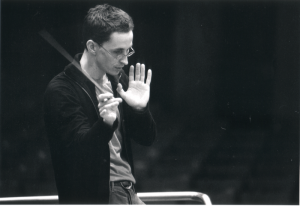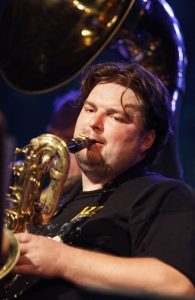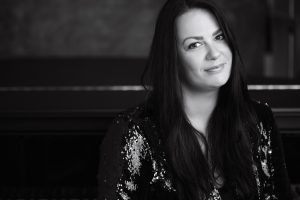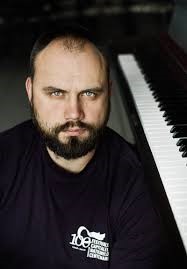Contemporary and Improvisational Music Specialisation: Master studies
Coordinator:
Prof. Dr. Indrė Baikštytė
Mob.: +370 651 29059
E-mail: indre.baikstyte@lmta.lt
Master studies
This specialisation is perfect for musicians wishing to develop contemporary music performance and improvisation skills. The two-year programme includes two inter-related alternatives to choose from Chamber Ensemble Art Project (Contemporary Music) and Improvisation Music Art Project. Semesters are thematically focused on: 1) contemporary music and ethnic music, 3) music and theatre/performance, 3) music and media. The following are the theoretical subjects (modules): Contemporary Music Analysis and Interpretation, Trends of Contemporary Music Performance and Music Composition, Digital Sound Processing, and others (see the Study Plan below).
Online application forms must be completed no later than 24 hours before the beginning of the entrance examination, which is indicated in the schedule of entrance examinations: https://lmta.lt/en/english-lmta-welcomes-foreign-students/english-studies/. EU citizens may compete for the state funded study places, and successful candidates will be exempt from the tuition fee.
The context of studies is the contemporary and improvisational international scene. The team of teachers includes visiting professors who will lead workshops, seminars, and intensive collaborative projects. Each semester will end up with a public performance. Participation in contemporary music festivals, placements in contemporary ensembles and developed professional partnerships in Lithuania and abroad will help students to gradually integrate into professional life.
Contemporary Music (Chamber Ensemble) studies are headed by composer and conductor prof Vykintas Baltakas. The emphasis is placed on building the repertoire of written contemporary music, understanding contemporary notation, and mastering contemporary techniques. Repertoire studies include a stylistic and aesthetic overview of music written after 1950. Students in this specialisation will also have lectures on solo and ensemble improvisation.
Improvised Music (free improvisation) studies are headed by multi-reeds improviser assoc. prof. Liudas Mockūnas. Free improvisation course aims at the development of improvisational skills in solo and ensemble performance, providing knowledge in contemporary classical music (theoretically and practically), and developing students’ creativity. Students will be free to develop their own projects and will be encouraged to experiment. Study forms include regular one-to-one classes, group work and integrated project-based activities, i.e. masterclasses led by world known improvisers and interdisciplinary workshops.
Main Teaching Staff

Prof. Vykintas Baltakas
E-mail: lmta@baltakas.net
 Website: www.baltakas.net
Website: www.baltakas.net
Assoc. Prof. Liudas Mockūnas
E-mail: liudasmockunas@gmail.com
Biography: http://www.mic.lt/en/database/jazz/composers-artists/mockunas/

Prof. Dr. Indrė Baikštytė
E-mail: indre.baikstyte@lmta.lt
Biography: https://lmta.lt/en/darbuotojas/indre-baikstyte/
Lect. Arnas Mikalkėnas
E-mail: arnasmika@gmail.com
Biography: https://lmta.lt/en/darbuotojas/arnas-mikalkenas/
STUDY PLAN:
| Semesters |
|
|||||
| Subjects / modules | Credits (ECTS) | Final Assessment | ||||
| Chamber Ensemble Art Project / Improvisation Music Art Project |
|
Exam | ||||
| Instrument |
|
Exam | ||||
| Techniques of Contemporary Music Performance |
|
Exam | ||||
| Contemporary Music Analysis and Interpretation |
|
Exam | ||||
| Performance Theory and Practice |
|
Exam | ||||
| Trends of Contemporary Music Performance and Music Composition |
|
Exam | ||||
| Basics of Research Paper |
|
Exam | ||||
| Optional Subject |
|
Exam | ||||
| Digital Sound Processing |
|
Exam | ||||
| Politics of Culture and Development of Professional Arts |
|
Exam | ||||
| Final Research Paper |
|
Pass/Fail, Defence | ||||
| Master’s Art Project |
|
Defence | ||||
| Total ECTS: |
|
|||||
| Total ECTS: | 120 |
ENTRY REQUIREMENTS:
Admission to the second cycle study programme Music Performance, Contemporary Music is open for individuals having completed the first cycle (Bachelor’s) studies in the field of Music.
The admission score (its maximum value is 10) consists of the following:
- The evaluation of entrance examination (performance of the contemporary chamber music programme or the improvisational music programme on the chosen instrument and music performance on the chosen musical instrument): weighted coefficient 0.6;
- The evaluation of the admission interview on matters related to the chosen study programme and: professional portfolio evaluation weighted coefficient 0.2;
- The average score of learning outcomes achieved in the first cycle studies (grades specified in the Diploma Supplement): weighted coefficient 0.2.
I. Entrance examination
1. Music performance on the chosen instrument. A selected piece/pieces of contemporary music programme (created after 1950) or improvisational music programme performance performed on the selected instrument.
The duration of the instrumental music performance programme is 10 minutes.
2. Music performance in the field of specialisation:
a) Improvised music:
1) Three improvised pieces of different characters (duration of one piece: one to two minutes);
2) Longer improvised piece (maximum duration: 10 minutes);
3) One piece of contemporary music or its part or transcription of a jazz piece (solo or in the ensemble; duration: up to 5 minutes);
b) Chamber music:
A large-scale contemporary solo or chamber piece (all parts).
The maximum duration of performance according to the specialisation is 20 minutes.
The examination takes place in a distance mode. The commission is provided with links to video recordings of the required programme. The video recording is to be performed not earlier than one year prior to the date of the entrance examination.
II. Admission interview on matters related to the chosen study programme
The admission interview is aimed at:
- Learning and evaluating the applicant’s knowledge and abilities in the chosen area of studies, their desire to improve further, expectations with regard to studies, profession-related plans for the future;
- Evaluating knowledge in the following areas:
- Analysis of the style, genre and dramaturgy of the chamber music repertoire prepared during the first cycle studies (for those who completed the first cycle studies in the field of Music);
- The art of contemporary music in the context of Lithuania and global music culture; the analysis of the programme performed during the examination in terms of content, form and style, interpretational and/or creative solutions.
- Discussing the professional portfolio.
The following are the mandatory parts of the professional portfolio:
- Motivational letter (up to 1 page) reflecting the applicant’s readiness to study the chosen specialisation and expectations with regard to studies;
- Description of former studies (higher education institution, study programme, teacher/teachers, participation in international exchange programmes, excellence courses, seminars, etc.);
- Description of concert activities (art projects, ensembles, etc.), list of accumulated repertoire;
- Documents (or their copies) proving art activities and professional development are presented in the portfolio.
In cases when candidates wish to apply to the state funded study place, formal recognition of the qualification (Bachelor’s diploma) is requested. More information is available at the Centre for Quality Assessment in Higher Education: https://www.skvc.lt/default/en/60/apply/documentation_requirements
For inquiries:
Prof. Indrė Baikštytė
Coordinator of Master’s Specialization Contemporary Music
Mob.: +370 651 29059
E-mail: indre.baikstyte@lmta.lt
Rima Rimšaitė
Head of International Relations Office
Phone: +370 5 2124967
E-mail: rima.rimsaite@lmta.lt
Admissions: admission@lmta.lt

